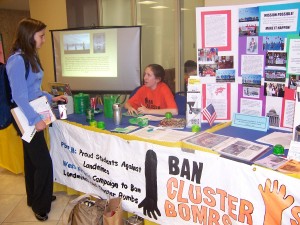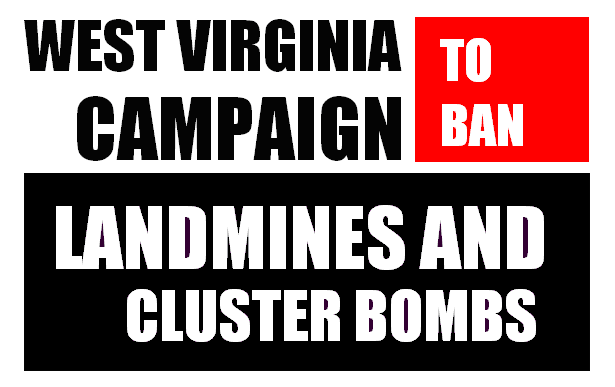
Central America became the first region to become free of cluster munitions with Belize’s accession to the international treaty banning cluster munitions, said the Cluster Munition Coalition at the close of the treaty’s meeting. In addition, the Republic of Congo announced ratification of the treaty at the meeting, bringing up to 114 the number of states that have joined the Convention.
“Central America’s unanimous support for the ban on cluster munitions should embolden other nations to cooperate in eradicating these insidious weapons that cause unacceptable harm,” said Jesús Martinez, El Salvador Cluster Munition Coalition member. “We do not want to see any more victims from cluster munitions and urge no use of these weapons anywhere, anytime by anyone.”The announcement was made at the Fifth Meeting of States Parties to the Convention on Cluster Munitions, which ended today in San José Costa Rica. Costa Rica hosted the meeting – the first ever of its kind to be held in Latin America, taking over the convention presidency from Zambia.
Belize’s accession on 2 September means that every country in Central America is a State Party to the 2008 Convention on Cluster Munitions which prohibits the use, production, transfer, and stockpiling of cluster munitions, and requires the clearance of cluster munition remnants within 10 years, destruction of stockpiles in 8 years, as well as the provision of assistance for victims.
States spoke out strongly in support of the global ban on the weapon at this week’s meeting. “Cluster munitions are particularly unacceptable because of their scattered and non-localized detonations that can remain active for decades and then result in the mutilation and deaths of innocent people, destroy families, schools, hospitals and farmland, exacerbate poverty and limit economic development,” said Costa Rican President Guillermo Luis Solis, in the opening ceremony for the meeting.
As a further expression of their support for the cluster bomb ban norm, nearly 40 countries spoke out at the meeting to condemn or express concern about recent or ongoing cases of cluster munition use.
The WEST VIRGINIA CAMPAIGN TO BAN LANDMINES AND CLUSTER BOMBS continues to encourage the U.S. to join the global ban on cluster munitions. PSALM Students Against Landmines and Cluster Bombs organized an awareness event to ask for U.S. representation at the Meeting. “It is imperative that the U.S. join the world in eliminating these weapons that kill and maim innocent civilians the world over” said WVCBL/PSALM Coordinator, Nora Sheets.
In the final report of the meeting all States Parties formally condemned any use of cluster munitions, anywhere, by anyone.
Cluster munitions have been used in 2014 in South Sudan and Ukraine, while the Syrian government’s use of cluster munitions since mid-2012 has left a devastating civilian casualty toll in its wake. According to Cluster Munition Monitor 2014, more than 1,600 casualties from cluster munitions in Syria have been recorded since 2012. On 1 September, Cluster Munition Coalition member Human Rights Watch reported new evidence of cluster munition use by Islamic State forces in Syria.
“Powerful declarations this week in support of the global ban on this horrific weapon and the resounding condemnations of ongoing use of cluster munitions show how states are committed to consign these weapons to the dustbin of history,” said Cluster Munition Coalition Director, Sarah Blakemore.
The strong progress reported on stockpile destruction this week demonstrated a clear commitment by states to eliminating the global threat from cluster munitions. Three States Parties, Denmark, FYR Macedonia, and the United Kingdom, as well as signatory Canada announced that they have destroyed all stockpiles of the weapon since the last formal Convention meeting in Lusaka. Canada also noted that it decided not to retain cluster munitions for training even though permitted to do so under the Convention. Three countries, Italy, Germany and Japan are anticipated to finish their stockpile destruction by 2015.
Many states parties with high contamination from cluster munitions are actively working to meet their treaty obligation to clear the land of cluster munitions and protect the communities still facing a daily threat from such remnants. “The good news is that most countries can clear their territory in less than 5 years with political will, the latest survey methodology, and adequate international support. There are only a few cases where clearance should take longer,” said ICBL-CMC Policy Director Tamar Gabelnick. The Cluster Munition Coalition warmly welcomed the announcements by Mauritania and Norway of completion of cluster munition contamination in the past year.
Victim Assistance committee co-chairs Mexico, and Afghanistan – a country highly contaminated by cluster munitions – called for increased international assistance to realize the promise of the convention to safeguard the rights of cluster munition survivors and victims everywhere. The landmark provisions for assistance to victims in the Convention oblige states to provide essential support for victims of this indiscriminate weapon.
“Victims often struggle to access mainstream services because they live far from services, and they are poor. Special efforts are needed so that victims are not left behind in accessing specialized health care or securing employment,” said cluster munition survivor and ban advocate from Tajikistan, Umarbek Pulodov, addressing states at the meeting.
Meeting host Costa Rica took over presidency of the Convention from Zambia during the week with a pledge to expand treaty membership and work to strengthen the norm banning cluster munitions as states prepare for the First Review Conference of the Convention, to be held in Dubrovnik, Croatia in September 2015.
114 Countries have joined the Convention on Cluster Munitions
http://www.stopclustermunitions.org/en-gb/the-treaty/treaty-status.aspx
83 Countries have yet to join the Convention on Cluster Munitions
http://www.stopclustermunitions.org/en-gb/the-treaty/treaty-status.aspx
About cluster bombs:
A cluster munition (or cluster bomb) is a weapon containing multiple often hundreds of small explosive submunitions or bomblets. Cluster munitions are dropped from the air or fired from the ground and designed to break open in midair, releasing the submunitions over an area that can be the size of several football fields. This means they cannot discriminate between civilians and soldiers. Many of the submunitions fail to explode on impact and remain a threat to lives and livelihoods for decades after a conflict.
About the Cluster Munition Coalition (CMC):
The Cluster Munition Coalition (CMC) is an international coalition of nongovernmental organizations (NGOs) including WVCBL/PSALM working in around 100 countries to eradicate cluster munitions, prevent further causalities from these weapons and put an end for all time to the suffering they cause. The CMC works to change the policy and practice of governments and organizations towards these aims and raise awareness of the problem amongst the public.
